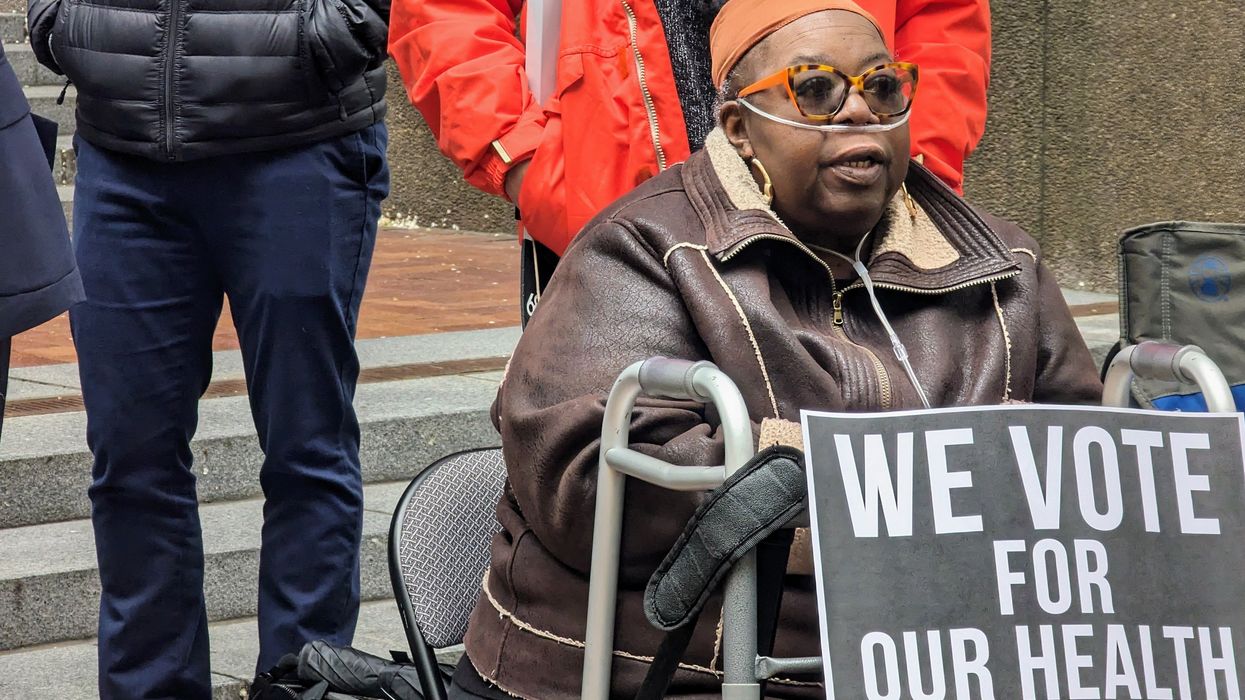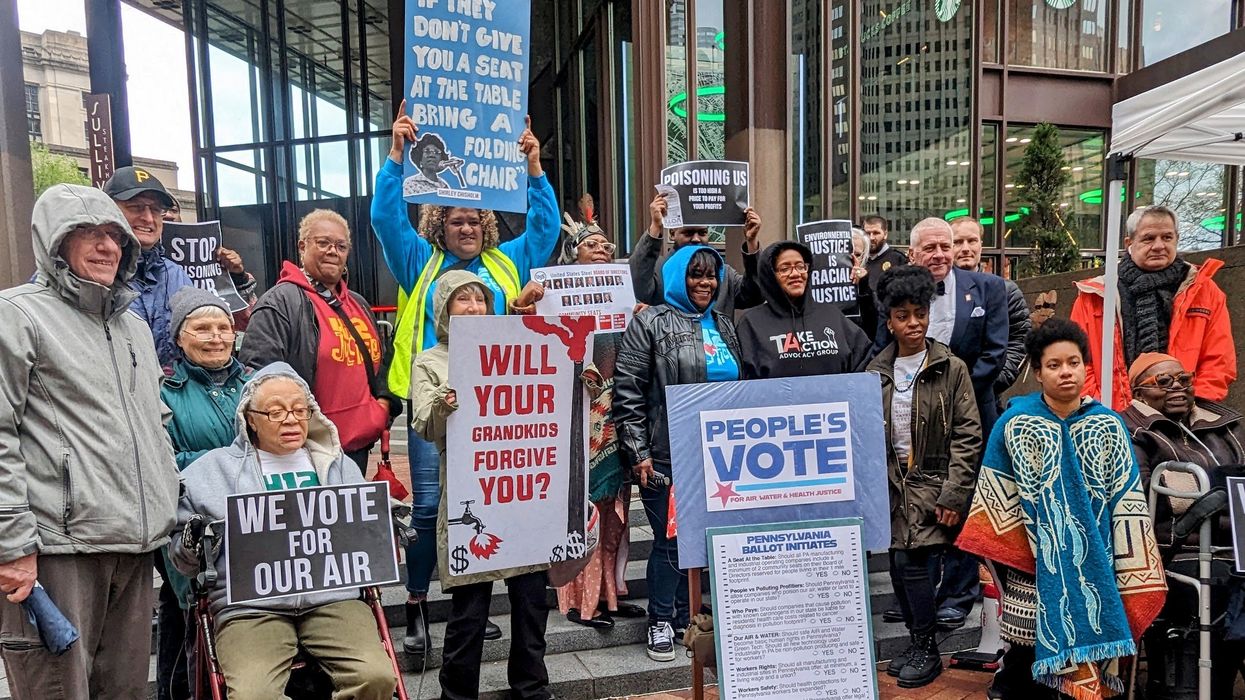
PITTSBURGH — On a windy, rainy afternoon in early April, bundled-up protesters gathered in front of U.S. Steel’s corporate headquarters downtown ahead of a shareholder vote on the sale of the company to Japanese-owned Nippon Steel.
They held signs bearing messages like, “Will your grandkids forgive you?” and “If they don’t give you a seat at the table, bring a folding chair.”
The ongoing political debate over the pending sale of U.S. Steel to Nippon Steel has reached the highest levels of government, but residents near the company’s Pittsburgh-area plants say those conversations are excluding the voices of communities subjected to U.S. Steel’s health-harming emissions.
“It’s completely unacceptable and untenable for a community to be subjected to thousands of violations of the Clean Air Act for decades,” Matt Mehalik, executive director of the Breathe Project, a coalition of more than 40 environmental advocacy groups in the region, told EHN during the protest. “The people at the negotiating table need to deal with these issues as part of the sale process.”
After the protesters on the sidewalk chanted “U.S. Steel, you steal our health,” shareholders gathered in a boardroom in the skyscraper high above voted to sell the company to Nippon Steel for $14.1 billion, with 98% of shares voting in favor of the deal. It remains to be seen whether it will go through or be halted by regulators.
“This sale has been pushed forward by U.S. Steel at the expense of both community members and workers,” Hilary Lewis, the steel director for Industrious Labs, an environmental advocacy organization focused on decarbonizing heavy industry, told EHN. “There’s been a lot of pushback because these important stakeholders are just not being heard.”
U.S. Steel has been fined more than $20 million for Clean Air Act violations at its Pittsburgh-area facilities since 2018, and the company recently settled a lawsuit for about $25 million with environmental advocacy groups over more than 12,000 air permit violations in the region. It’s a decades-long pattern and impacted residents accuse the company of acting under a “pay-to-pollute” model, opting to pay fines rather than stop violating clean air laws. Meanwhile, climate advocates say U.S. Steel is lagging behind the rest of the industry when it comes to advancing clean technology and phasing out health-harming and climate-warming coal.
In April, President Joe Biden told steel union workers in Pittsburgh that his administration would attempt to block the sale of the company to Nippon Steel and the national security review that’s now underway could last at least a year. The United Steelworkers Union has opposed the sale, expressing concerns about whether Nippon Steel would honor its existing commitments to things like pensions and other worker benefits and citing Nippon Steel’s history of hiring “anti-union lawyers” in disputes with its U.S. steel plants. The Japanese company delayed the takeover last week by three months.
While the protesters outside U.S. Steel tower want to see the company’s environmental compliance issues in Pennsylvania addressed in these debates, the potential sale has also sparked concerns about how the deal might impact U.S. Steel’s existing, hard-won environmental compliance agreements in the region.
“We’re talking about another country millions of miles away,” Natalie Morris, a resident of Braddock who lives near U.S. Steel’s Edgar Thomson Mill, told EHN during the protest. “I don’t think they’re going to care about us.”
And — whether or not the sale goes through — U.S. Steel remains a distant laggard in the push toward cleaner steelmaking, as steelmakers nationwide are increasingly turning away from coal.
What will a sale mean for U.S. Steel’s existing environmental commitments?
U.S. Steel operates three facilities in the U.S. that still rely on coal. Two are in Pennsylvania’s Monongahela Valley near Pittsburgh and one is in Gary, Indiana.
The company was once an industrial powerhouse, but has faced challenges for several decades due to competition from cheaper steel produced in other parts of the world. The proposed sale to Nippon Steel is pitched as a solution to the company’s financial woes, but union opposition has framed it as a means to generate exponential profits for executives at the expense of workers.
All three U.S. Steel plants still reliant on coal are regularly fined for violating clean air regulations. The Clairton Coke Works, about 15 miles south of Pittsburgh, is the largest coke-making plant in the country —a process that involves cooking coal at extremely high temperatures to create a key steelmaking ingredient known as “coke.” Coke made at the Clairton Coke Works supplies both the other western Pennsylvania steel plant and the Indiana plant.
Coke oven emissions are associated with a long list of negative health effects. Residents near the Clairton Coke Works, many of whom are low-income people of color, have higher rates of asthma, higher cancer risk and higher risk of developing more severe cases of respiratory and lung disease.
Residents impacted by the plant’s ongoing pollution problems in Pennsylvania are also worried about what the sale might mean for existing legal agreements over pollution violations.
For example, in March a judge finalized a settlement that requires U.S. Steel to spend nearly $20 million upgrading its western Pennsylvania facilities and put an additional $5 million into health and clean air programs in local communities. It’s the largest Clean Air Act citizen suit payout in Pennsylvania history and the third-largest in U.S. history, according to environmental advocates.
“It’s completely unacceptable and untenable for a community to be subjected to thousands of violations of the Clean Air Act for decades.” – Matt Mehalik, Breathe Project
The settlement was the result of a lawsuit filed by the Allegheny County Health Department, which oversees local air quality, and environmental advocacy groups PennEnvironment and the Clean Air Council, in response to a fire that knocked out pollution controls at the company’s Clairton plant in 2018. The incident resulted in weeks of substantial Clean Air Act violations and well-documented health effects.
The agreement also requires U.S. Steel to invest in measures to prevent similar pollution events, creates financial penalties for pollution control equipment outages for the next five years and requires the company to shut down one of its oldest, dirtiest coke ovens.
“This is not just about a financial penalty to U.S. Steel,” Matt Donohue, a staff attorney at the National Environmental Law Center, who argued the case, told EHN. “During discovery it became apparent that if nothing was done there would be more outages, more pollution events and more harm to the communities surrounding the plant. Preventing that from happening was the most important thing to us.”
In an email, U.S. Steel spokesperson Andrew Fulton said, “U. S. Steel employs more than 3,000 hardworking men and women throughout its [southwestern Pennsylvania] facilities … their work has yielded exceptional, measurable results including an environmental and permit regulation compliance rate exceeding 99%.”
U.S. Steel has reached similar settlements over other pollution incidents. According to Donohue and a spokesperson for U.S. Steel, these agreements will remain in place and remain legally binding regardless of who owns the company.
“That’s true for all agreements like this, but because we knew the sale was possible, we also went through our agreement with a fine-toothed comb to make sure that whoever owns this company has to comply with all of the terms of the agreement on the same timeline,” Donohue said.
What would it take for U.S. Steel — or whoever owns the company next — to clean up its operations in Pennsylvania?

The movement toward cleaner steelmaking in the U.S. is already well underway. About 70% of steel produced in the country is made with electric arc furnaces, which do not use coal, while the remaining 30% still use coal to power blast furnaces. Around 72% of the industry’s climate-warming pollution comes from those remaining blast furnaces.
“Not only is [coal-based steelmaking] inherently dirty, but [Clairton Coke Works] is also regularly out of compliance with health-protective regulations,” Lewis, the advocate from Industrious Lab, said. “A half measure would be just complying with the law, but if we’re actually talking about protecting community health, we need to get coke out of steelmaking.”
In 2019 U.S. Steel announced $1.5 billion in upgrades to its western Pennsylvania facilities, but reneged on that promise in 2021 and instead put that money toward an electric arc furnace in Arkansas.
Electric arc furnaces essentially recycle scrap steel instead of using coke to make new steel products. But on its own, an electric arc furnace isn’t capable of making “virgin” steel, which is considered higher quality, less likely to crack and is needed for certain steel applications, including much of what’s used by the automobile industry.
In order for U.S. Steel to do away with coal at its Pennsylvania plants, they’d need both electric arc furnaces and a method of producing direct reduced iron, a replacement for coke that can be made using green hydrogen from renewable energy.
“A half measure would be just complying with the law, but if we’re actually talking about protecting community health, we need to get coke out of steelmaking.” – Hilary Lewis, Industrious Labs
Last month, a Swedish company announced the first “green” steel plant proposed in the U.S. If the project moves forward, the Mississippi plant will use both electric arc furnaces and direct reduced iron made with green hydrogen to make steel. Green hydrogen isn’t yet available at the scale required to meet total demand for steelmaking, Lewis conceded, but the U.S. Department of Energy is working to change that.
“This Mississippi project is a perfect model that U.S. Steel could follow,” Lewis said, noting that a company in Boston is working on a similar green steel project that uses electricity rather than green hydrogen. “That technology isn’t as commercially advanced as green hydrogen, but the point is that there are numerous clean technologies that U.S. Steel could move toward using instead of coal.”
Making that transition will also be essential to staying competitive as the world decarbonizes, according to Lewis.
“The auto industry makes up about a third of all steel sales,” Lewis said. “That industry has climate goals and commitments that will eventually require them to eliminate the use of steel made using coal, and when they do, they’ll be taking their business to facilities like the new green steel plant in Mississippi and that will leave companies still producing steel with coke behind.”
U.S. Steel declined to go on the record about whether the company has or will consider investing in these technologies for its western Pennsylvania facilities, but noted that they’re working on carbon capture and battery-powered locomotive projects.
“According to the Allegheny County Health Department, hazardous air pollutants have decreased by 80% in Allegheny County over the last 12 years,” Fulton, U.S. Steel spokesperson, said. “U.S. Steel has invested roughly $750 million in its Mon Valley operations in the past five years and invests more than $100 million per year on environmental compliance.”
As for the potential sales impact on environmental efforts, both U.S. Steel and Nippon Steel have set goals of being carbon neutral by 2050, but “neither company has a very concrete plan for how they’re going to do this and neither company is addressing concerns about the ongoing use of coal in steelmaking,” Lewis said.
Nippon Steel has made some investments in electric arc furnaces, but Mehalik, of the Breathe Project, said Nippon Steel also has a record of environmental issues at some of its plants.He expressed concern that even if the company sells, health harms from its Pennsylvania facilities could persist.
“Everywhere that U.S. Steel operates communities are affected and harmed, but it’s particularly acute here,” Mehalik said. “Whether the sale proceeds or not, whoever ends up owning U.S. Steel needs to bring these things to a close.”





